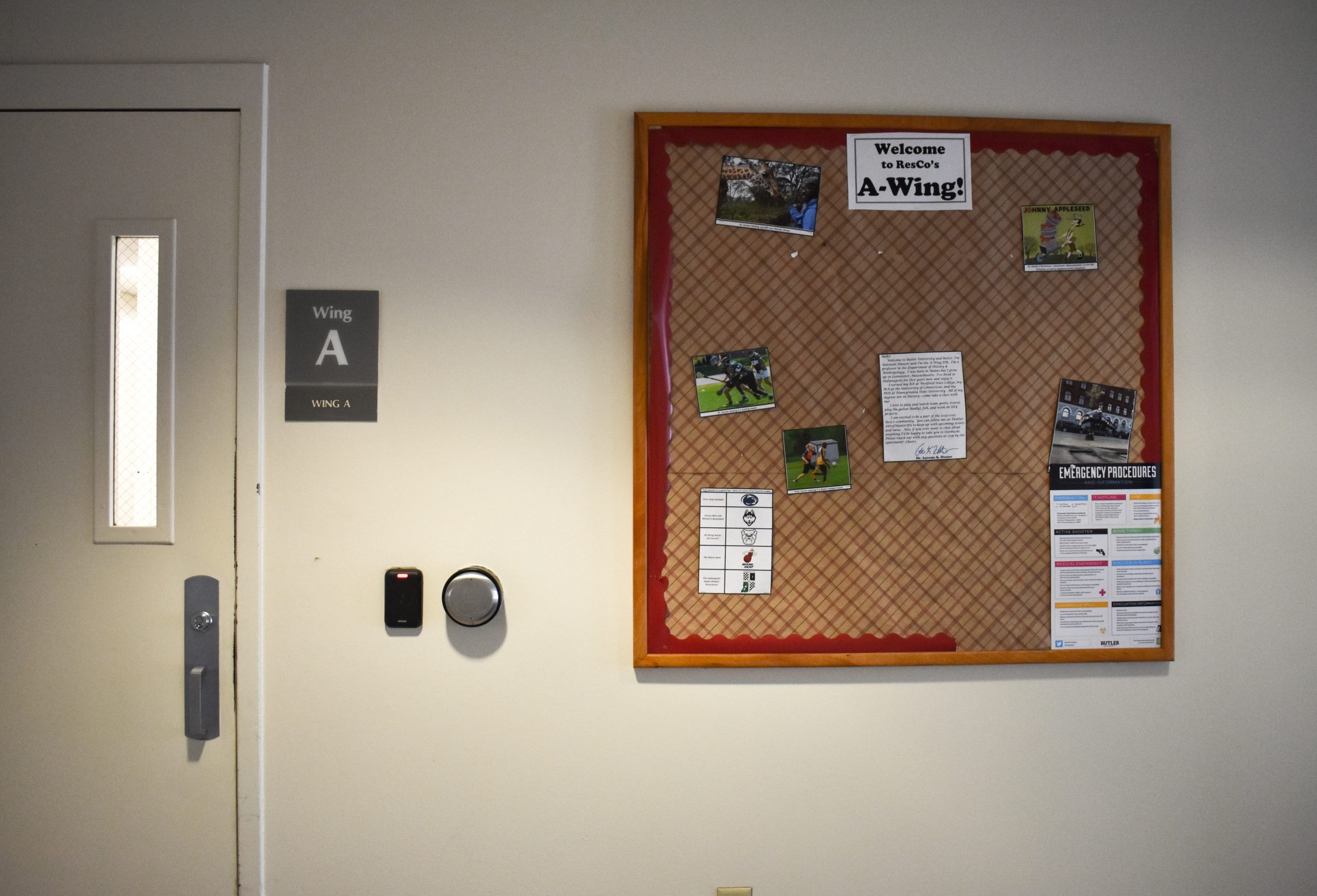For many resident assistants, navigating their duties amid COVID-19 has been a difficult task. Photo by Lauren Jindrich.
DAVID CLARK | STAFF REPORTER | daclark1@butler.edu
Quarantine — a word that fell outside the vocabulary of many people a year ago — spares no one. Frontline workers and health professionals. Athletes and university professors. Even the average student is not immune to quarantine’s effects.
But perhaps the group that quarantine has hit hardest on college campuses is resident assistants, who serve as liaisons between the Office of Residence Life and campus residents.
Thomas Dziwlik, a sophomore entrepreneurship and innovation and marketing double major, is an RA in ResCo. He said difficulties stem from both being responsible for their residents as well as staying on top of university communications.
“In a lot of ways we’re still right there with the students,” Dziwlik said. “I don’t always have the answer [to residents’ questions] because I’m still a student.”
Indeed, during a time where COVID-19 has infiltrated every part of the traditional college experience, Dziwlik said it is hard to stay on top of all the information the university puts out. He admitted that at other times, it can be difficult to navigate restrictions placed on him by residence life.
RAs cannot meet in person with their residents for check-ins throughout the semester, which is a departure from previous years. Now, these meetings are conducted over Zoom, via text message or in other ways that are accessible to students. RAs cannot hold in-person programming for their floor either, since this would be difficult to conduct while adhering to COVID-19 restrictions.
The most recent example of navigating restrictions came two weekends ago, where Irvington House was temporarily placed on lockdown after a cluster of confirmed positive cases of COVID-19 were identified. Dziwlik said multiple residents contacted him after the university sent out an email mandating all Irvington residents return to their rooms. Though Dziwlik knew the situation was related to COVID-19, he was not able to communicate this to residents that were worried for their personal safety.
“Immediately my role shifted from, ‘hey, let me be here to connect you to the university and kind of be a guide,’ to more of a, ‘let me present you with accurate information and manage your expectations,’” Dziwlik said.
Some RAs find their situation decidedly more positive, such as Irvington RA Mason Lovett, a junior computer science and mathematics double major, said. He described the Irvington lockdown as a quick, decisive action by the university.
“The administration has done a good job just kind of giving RAs the tools we need,” Lovett said. “I’m grateful that I have a lot of people that I could ask if I have any questions.”
Lovett’s only major difficulty navigating quarantine has come in connecting with his hall’s residents, with whom he meets virtually. He acknowledged that while technology might not be the best way to foster community and confront certain issues, COVID-19 necessitates a different strategy for RAs to approach problems.
“Given the circumstances, I think it’s really great that we’re able to even be here in the first place,” Lovett said. “I think it’s really great that we’re able to keep doing that, even if it’s not ideal.”
Emma Lutes, a senior health science major, serves as an apartment community assistant for Apartment Village, and said she has mixed feelings about the university’s response to a COVID-19 outbreak. Lutes said in an email interview with The Butler Collegian that while the Residence Life Office and RAs have individually responded well to problems related to COVD-19, the university’s policies have made everyone’s job harder.
“We’re understaffed, under-compensated, and stretched thin at every level of our organization,” Lutes said in the email. “It has been a miserable year to be a student, but an even worse year to be an RA or ACA.”
While students receive carefully-crafted communications from the university, Lutes said residence life staff must determine how to put the university’s goals into practice. Lutes said enforcing university regulations can often seem a thankless job, that RAs are often left to pick up the pieces.
Dziwlik said that other key RA responsibilities, such as answering the duty phone, are still works in progress during quarantine and isolation. While on duty, RAs can field calls that range from a resident’s suitemate throwing a party to a student getting seriously injured. Generally, RAs are also encouraged to remain very cautious before approaching their residents’ problems in person. With COVID-19 restrictions in place, Dziwlik said his approach to conflict resolution now relies more on communication over the phone before ever leaving his room.
“Can I leave my room? Should I not?” Dziwlik said. “With being an RA specifically in quarantine, that role doesn’t stop. I need to make sure I’m following the right steps so that everyone else kind of stays in line.”
Above all, Dziwlik said he wants to continue doing what is needed to keep himself and his residents safe. But should a situation present where Dziwlik personally ended up in quarantine?
“Man,” he said. “That would be a challenge.”



